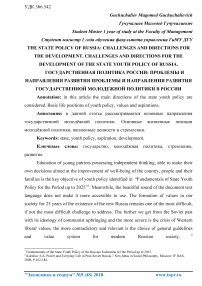Государственная политика России: проблемы и направления развития проблемы и направления развития государственной молодежной политики в России
Автор: Гучучалиев М.Г.
Журнал: Экономика и социум @ekonomika-socium
Рубрика: Основной раздел
Статья в выпуске: 5 (48), 2018 года.
Бесплатный доступ
В данной статье рассматриваются основные направления государственной молодёжной политики. Основные жизненные позиции молодёжной политики, жизненные ценности и стремления.
Государство, молодёжная политика, стремление, развитие
Короткий адрес: https://sciup.org/140238889
IDR: 140238889
Текст научной статьи Государственная политика России: проблемы и направления развития проблемы и направления развития государственной молодежной политики в России
Education of young patriots possessing independent thinking, able to make their own decisions aimed at the improvement of well-being of the country, people and their families is the key objective of youth policy identified in “Fundamentals of State Youth Policy for the Period up to 2025”1. Meanwhile, the beautiful sound of the document text language does not make it more accessible to use. The formation of values in our society for 25 years of the existence of the new Russia remains one of the most difficult, if not the most difficult challenge to address. The further we get from the Soviet past with its ideology of communist upbringing and the more severe is the crisis of Western liberal values, the more contradictory and relevant is the choice of general guidelines and value system for modern Russian society. 2
The sociological study carried out by the author of the thesis made it possible to form the following hierarchy of life values of young people: family (77.6%), health (75.1%), interesting work (26%), career development and success (24.6%), good earnings (18.2%), personal freedom (14.6%), high-quality education (11%), faith in God (11%).
The lowest importance in the life, according to the youth, has participation in the social and political sphere. The fixation on the public service and devotion to the people are shared by only 3.9% of the respondents. Very few individuals gave answers about the desire to leave behind something necessary, to harmonize the community environment and so on.
There is a trend towards intellectual, creative and spiritual development in the way of life and thinking of young people. The incentive for it is a set of individualistic, but not shared values, desire for personal formation and self-realization. Accordingly, to ensure that the opportunities, talents and aspirations of young people contribute not only to personal but also to public development, to facilitate the project of Russian economic and social system modernization, it is necessary to establish mechanisms for youth mobility, both vertical and horizontal ones. In other words, to aim the work of state and municipal government bodies dealing with youth at human capital accumulation (namely, its growth was declared by the Ros Agency as priority for ¾ of young adults).
However, the project management that underlies the entire state youth policy today seems to be insufficiently effective and suitable for this purpose, because it increases the potential for human capital, rather than real value of the talents and abilities of people -the % of productive power of the individual, as A.M. Kushnir definitely articulated this concept.3
It is important to understand that today we need not only to engage young people in social practices (they have long been creating it in the social networks space, within their informal groups and societies). It would be more appropriate to speak about the way to consolidate the efforts of youth for the sake of % of mutual benefit: for their peers, fellow citizens and the country in general. However, short - term projects are not enough for this. The conditions are required, the operating system of social institutions, in which youth human capital is created and multiplied: intelligence, health, productive capacity, confidence in the future. And as a result, we’ll have patriotism, tolerance and ability to innovative thinking and self-organization.
Список литературы Государственная политика России: проблемы и направления развития проблемы и направления развития государственной молодежной политики в России
- Ermolin A.A. Youth Policy as a National System of Reproduction of Human Capital of the World Level//Public education. 2014, n. 7, P. 9-19.
- Koroliov S.A. Power and Everyday Life in Post-Soviet Russia//New Ideas in Social Philosophy. Moscow: IF RAS, 2006, P.162-184.
- Kushnir A.M. The Main Fault of Russian Education, or Why Do We Need Industrial Technology Parks and Children-andadult Educational Industries at School?//Public education. 2012, n. 7, P.11-18.
- Fundamentals of the State Youth Policy of the Russian Federation for the Period up to 2025.


